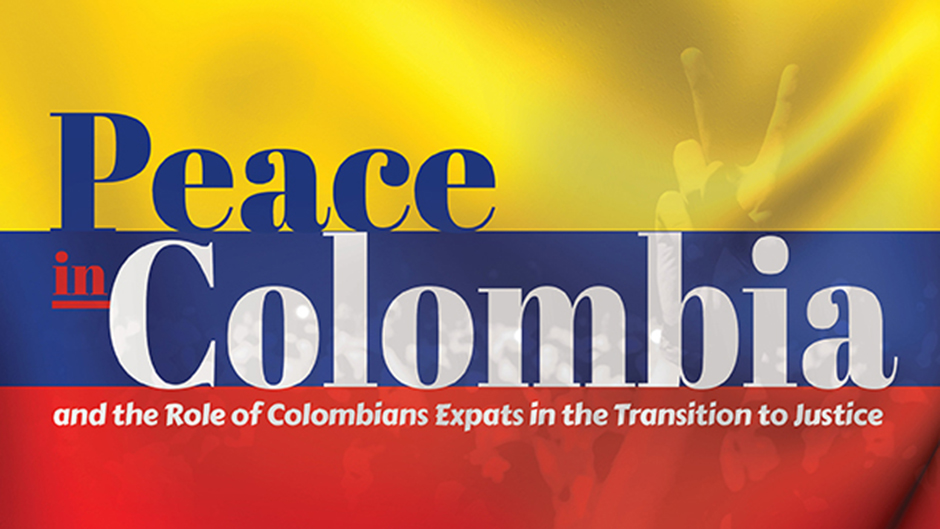On June 4, Miami Law’s office of International Graduate Law Programs joined the New York-based nonprofit Arraigo Foundation to host a bilingual webinar, “The Peace Agreement in Colombia and the Role of Colombian Expats in the Transition to Justice,” where renowned experts led a discussion on the country’s implementation of the landmark 2016 peace accords from an institutional perspective.
Panel Comprised of Experts and Survivor of Colombian Conflict
The conversation was moderated by Paula C. Arias, Miami Law lecturer and director of the International Moot Court Program, who has practiced law in her native Colombia and written about the conflict.
The panel was comprised of Father Francisco de Roux and Carlos Martín Beristain, representatives of the Colombian Truth Commission; Roberto Carlos Vidal, Magistrate President for the Special Jurisdiction for Peace; Bertha Lucia Fries, a survivor of the Colombian conflict who has participated in reconciliation efforts; and Pablo Rueda Saiz, a Miami Law associate professor who has served as an attorney in several Colombian and international institutions. Opening remarks were given by Anthony E. Varona, dean and an M. Minnette Massey Professor of Law.
Background on the Discord in Colombia
Over the last several decades, the Colombian government has negotiated multiple peace agreements with armed groups, the most recent being the 2016 accord with the Revolutionary Armed Forces of Colombia—People's Army, one of the largest and oldest paramilitary forces in the Western Hemisphere. The agreement included demobilizing and disarming the group’s 7,000-10,000 members, with the ultimate aim of national reconciliation. Yet total peace remains elusive, as thousands of FARC fighters refuse to comply and many Colombians reject the deal as too soft.
Combining their respective expertise and perspective, the panelists aimed to generate a neutral, educational, and objective space to talk about this highly charged and complex issue. They analyzed the integral system of truth, justice, and reparations for the millions who have been impacted by the conflict, and how institutions can help Colombian society transition from a culture of violence to a culture of peaceful coexistence. Viewers from all over the world signed in to watch the talk unfold.
Colombia's Diaspora Community
The discussion also centered on the role of Colombia’s large diaspora community, which has generally been excluded from the peacebuilding process and national debates on how to move forward. Totaling over 4.7 million across the world—including at least 400,000 directly victimized by the conflict—to this day it remains the largest community of refugees in the Americas, making up roughly 10 percent of the country’s 50 million citizens. Only in the last few years have members of the diaspora organized and represented themselves as important stakeholders in Colombian political issues, serving as special ambassadors from afar.
“The peace agreement has generated great controversy among Colombians, however the peace process has been implemented despite all the criticism, which is why both Colombians within and outside the country, supporters or not, need to get involved,” Arias said. “This panel had as an objective to reach out to the diaspora around the globe to start the process of inclusion of those outside of Colombia.”
“The webinar provided the opportunity to learn first-hand from key actors from the Colombian Truth Commission and the Special Jurisdiction for Peace about the progress regarding the implementation of the Colombian peace accord,” said Yasmina Assis, associate director of Miami Law’s International Graduate Law Programs and lecturer in law. “We look forward to many more initiatives like this one and believe our Miami Law community will greatly benefit from jointly-hosted educational initiatives.”
The conference was co-sponsored by the Colombian Truth Commission and the Special Jurisdiction for Peace and was conducted in the panelists’ native Spanish, with simultaneous English interpretation provided by Andrés Ceballos and Yuri Orozco.
“The panel, which was presented by individuals directly involved in the negotiations of the Colombian peace agreement, provided space for important discussions about one of the most controversial issues in Colombian history,” said Colombian-born Maria Clara Moreno, J.D./LL.M. in International Law ‘18, who attended the event.
“Debates like such are relevant to show that reaching true peace in Colombia goes beyond the Peace Agreement and depends on the continuous efforts of all Colombians around the world.”
Listen to the panel discussion here.

